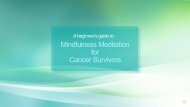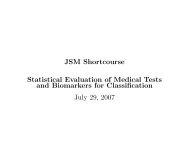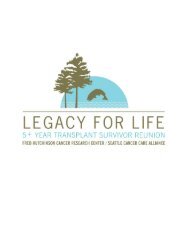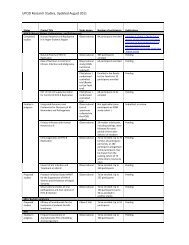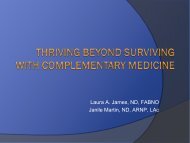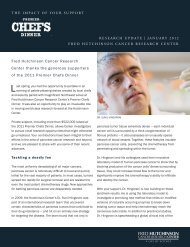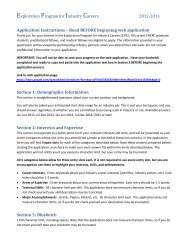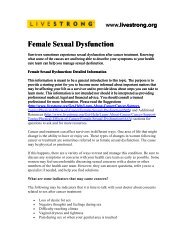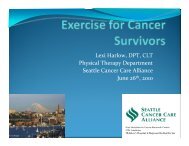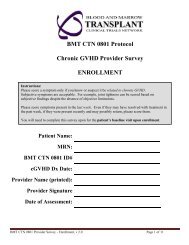Summer Undergraduate Research Program - Fred Hutchinson ...
Summer Undergraduate Research Program - Fred Hutchinson ...
Summer Undergraduate Research Program - Fred Hutchinson ...
You also want an ePaper? Increase the reach of your titles
YUMPU automatically turns print PDFs into web optimized ePapers that Google loves.
Excerpt from The Last Lecture<br />
The Lost Art of Thank-You Notes<br />
Showing gratitude is one of the simplest yet most powerful things humans can do for each other . And<br />
despite my love of efficiency, I think that thank-you notes are best done the old-fashioned way, with pen<br />
and paper .<br />
Job interviews and admissions officers see lots of applicants. They read tons of resumes from “A” students<br />
with many accomplishments . But they do not see many handwritten thank-you notes .<br />
If you are a B+ student, your handwritten thank-you note will raise you at least a half-grade in the eyes of<br />
a future boss or admissions officer. You will become an “A” to them. And because handwritten notes have<br />
gotten so rare, they will remember you .<br />
When I’d give this advice to my students, it was not to make them into calculating schemers, although I<br />
know some embraced it on those terms . My advice was more about helping them recognize that there are<br />
respectful, considerate things that can be done in life that will be appreciated by the recipient, and the only<br />
good things can result .<br />
For instance, there was a young lady who applied to get into the ETC and we were about to turn her down .<br />
She had big dreams; she wanted to be a Disney Imagineer. Her grades, her exams and her portfolio were<br />
good, but not quite good enough, given how selective the ETC could afford to be . Before we put her into the<br />
“no” pile, I decided to page through her file one more time. As I did, I noticed a handwritten thank-you note<br />
had been slipped between the other pages .<br />
The note hadn’t been sent to me, my co-director Don Marinelli, or any other faculty member . Instead,<br />
she had mailed it to a non-faculty support staffer who had helped her with arrangements when she came<br />
to visit . This staff member held no sway over her application, so this was not a suck-up note . It was just<br />
a few words of thanks to somebody who, unbeknownst to her, happened to toss her note to him into her<br />
application folder . Weeks later, I came upon it .<br />
Having unexpectedly caught her thanking someone just because it was the nice thing to do, I paused to<br />
reflect on this. She had written her note by hand. I liked that. “This tells me more than anything else in<br />
her file,” I said to Don. I read through her materials again. I thought about her. Impressed by her note, I<br />
decided she was worth taking a chance on, and Don agreed .<br />
She came to the ETC, got her master’s degree, and is now a Disney Imagineer .<br />
I’ve told her this story, and now she tells it to others .<br />
Despite all that is now going on in my life and with my medical care, I still try to handwrite notes when<br />
it’s important to do so . It’s just the nice thing to do . And you never know what magic might happen after it<br />
arrives in someone’s mailbox .<br />
Source<br />
• Pausch, Randy, and Jeffrey Zaslow . The Last Lecture . 1st ed . New York: Hyperion, 2008 .<br />
71



